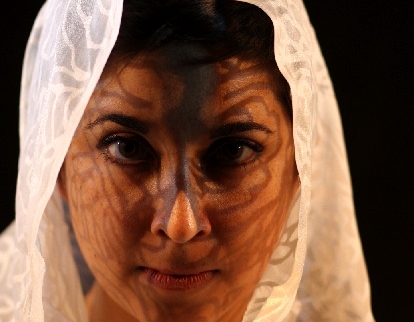Kamala Sankaram’s “Thumbprint” makes searing impact in world premiere

Kamala Sankaram as Mukhtar in her opera “Thumbprint,” which had its world premiere Friday night at the Prototype festival.
The true story of Thumbprint — heard in its world premiere Friday night at the Prototype festival — seems an ideal fit for the dramatic opera tradition: Mukhtar Mai is a Pakistani woman who in 2002 was gang-raped by men of the Mastoi tribe seeking revenge for an imagined offense against their honor, and left by her attackers and family to kill herself. Instead, she found the strength to seek legal justice and to found a school to teach girls and women, who like her were illiterate, to read and write. The themes of personal transformation and triumph against a perverted patriarchal tradition are almost ready-made.
They also could easily have been turned into the worst kind of operatic cliché, or the neatly packaged survivor-of-the-week stories that dominate pop culture narratives. Thumbprint is, instead, a streamlined and powerful music drama, affecting exactly because it is, mostly, a direct and focussed narrative that trusts the audience to see, hear and understand exactly what is going on and what it all means.
All credit and praise go to its vibrant star and composer, soprano Kamala Sankaram, and to librettist Susan Yankowitz. Their concept is Hemingway-esque in aesthetic and execution, with short lines of text with direct action set to succinct vocal phrases and powered by the rhythmic vocabulary of the tabla bol. The music comes out of the Meredith Monk tradition, with repeated vocal lines and full-bodied singing. Steven Osgood led the chamber ensemble — piano, bass, percussion, flute, viola and violin — with precision.
Sankaram’s composing displays both sophistication and strength. Her harmonic rhythm is varied and supple, and the opera has tremendous musical and dramatic forward drive, the clear two act structure takes ninety minutes but feels considerably shorter.
She and Yankowitz show considerable craft in how they shape the text and music for each character and dramatic idea. Mukhtar’s eloquence and singing gradually build through the piece; her father, mother and sisters falter then rise, her attackers are condescending and smug, her young brother Shakur is winsome and naïve.
As a performer, Sankaram sings beautifully and is full of ease and vitality on stage. The rest of the cast is almost equally fine; mezzo-soprano Theodora Hanslowe is Mukhtar’s mother; soprano Leela Subramaniam her sister, bass Steve Gokool her father (and the trial judge). Kannan Vasudevan (who plays Shakur and numerous minor characters) had trouble supporting his tenor voice in its higher range.
Everyone except Sankaram does quadruple-duty and their changing characterizations are clear. Special consideration goes to tenor Manu Narayan, primarily as Faiz, a Mastoi leader. He has an intense and powerful stage presence and sings with great character. As Faiz, he also has some of the best music, a declamatory aria where, from the witness stand, he sings: “I am a link in the chain of our ancient tribe/I am a link of tradition/I will not be the one to break it!.” The words and music come together to show the drama with a force that rivals the great “Batter my hear, three person’d God” from John Adams’ Doctor Atomic.
The opera falters in two spots, the first being the rape itself. Sankaram and Yankowitz show what Mukhtar experiences with music and words, which can only fail to express the horrific violence. Mukhtar’s singing is also redundant: at the back of the stage, one of the Mastoi tribesmen slashes at sacks of rice with a knife, in time with the music. As the contents spill forth, the brutality of the attack and the utter objectification of the character are unmistakable. It is a brilliant bit of staging from director Rachel Dickstein.
The second is when Mukhtar, comforted by her mother, finds the will to escape tradition deciding to pursue justice through the law. This is a key moment in the drama, but it is underserved by the music and libretto. The words abandon their active voice and the shape and style of the music become Puccini-esque. This gives Sankaram the chance to show off her lovely coloratura, but it also plays against the strengths of the piece and is the only hint of operatic cliché.
Mukhtar’s transformation is on display at the start of the coda, after the trial, conviction and sentencing. She sings “In a dry season/Someone must be the first drop of rain/Let it be me, let it begin with me.” The clarity and simple eloquence at the culmination of the drama are searingly, overpoweringly beautiful.
In real life, the men convicted and sentenced in the attack have by now all been acquitted on appeal. But Thumbprint is not their story, it is Mukhtar’s, and her transformation is both real and exceptional. The powerful punch of this opera culminates in the final moment, as the lights fade along with the music and the last image is Mukhtar’s name, projected on the back of the stage, the Urdu characters burning with blue flame.
Thumbprint will be repeated 4 p.m. January 11 at the Baruch Performing Arts Center. The Prototype festival continues through January 19. prototypefestival.org







Posted Jan 11, 2014 at 6:00 pm by ABilek
Are there plans to bring this show in Los Angeles?